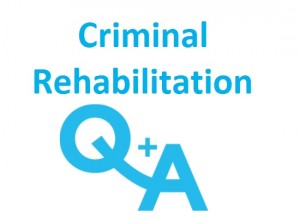Questions and Answers for Criminal Rehabilitation
In this article, I will address questions and answers for criminal rehabilitation, as there are several different circumstances for inadmissibility, in order for you to further understand what a criminal rehabilitation entails. A criminal rehabilitation is intended for foreign nationals who wish to come to Canada but unfortunately have been deemed inadmissible. This is usually due to criminal offences in their past. It was created to give foreign nationals an opportunity to be forgiven of their past criminal offences and proceed with entering Canada in the future with admissibility. If you feel as though you would be eligible to apply for a criminal rehabilitation, I suggest you read our article on “Who Qualifies for Criminal Rehabilitation” before reading this question and answer article. This article is intended to clarify any misunderstanding or confusion with regards to a criminal rehabilitation.
Q: How long does it usually take to receive a decision on my criminal rehabilitation application?
A: Criminal rehabilitation application processing times are usually over a year. Due to the many applicants who have been deemed inadmissible for several different reasons, it does take quite a large amount of time to analyze and process all of the applications properly. Therefore, if you have an approaching travel date, it is suggested to reschedule until you receive a decision on your application.
Q: What kinds of convictions are eligible for the fee waiver?
A: Convictions that are eligible for the fee waiver must be equivalent to criminal offences that are listed in the Immigration and Refugee Protection Act under Section 36 (2). It is important to note that the convictions vary based on your country. For instance, convictions that are included for the fee waiver to enter Canada include public mischief, shoplifting and/or driving under the influence of alcohol, just to name a few. However, there are serious criminal offences that are not included and are not eligible for the fee waiver. These serious criminal offences are listed under Section 36 (1) of the same act. For instance, these serious criminal offences include robbery, assault causing bodily harm, and/or fraud over $5,000 CDN. Additionally, convictions for child pornography or any sexual offence are not included.
Q: What if I received a pardon for the crime I committed. Am I still allowed to enter Canada?
A: This entirely depends on which country issued the pardon. For instance, if you have received a Canadian record suspension or pardon, as it was called in the past, you may enter Canada. Because the crime was pardoned, you are actually no longer inadmissible and are likely able to enter Canada. Of course, your entry into Canada also depends on other factors and whether or not you need a visa or an eTA. Therefore, it is always important to research what is required of you prior to entering Canada. Furthermore, if you received your pardon/discharge from another country that is not Canada, you must first check with the closest Citizenship and Immigration Canada (CIC) office to you for more information and to see if you are admissible.
Q: Why can’t I enter Canada if I was only convicted of a misdemeanor? I don’t understand.
A: When attempting to enter Canada, an Immigration officer will consider your admissibility to Canada most importantly. The Immigration officer will analyze the crime committed according to Canadian laws. They assess several factors, such as the nature of the offence, how long ago the offence happened, and whether any sentences were enforced. It is also important to note that a misdemeanor offence in the U.S. is not automatically reflected as the equivalent offence in Canadian law. Therefore, the Immigration officer ultimately makes the final decision for your admissibility.
Q: What if I do not qualify for Criminal Rehabilitation? How can I come to Canada?
A: If you don’t qualify for Criminal Rehabilitation, there is another option that you can pursue in order to come to Canada. Although it is not a long-term option, you may apply for a Temporary Resident Permit (TRP). In order to receive a TRP, you must show evidence that your reason to travel to Canada is justified and you are not a risk to Canadian society due to your inadmissibility. It is extremely essential that you provide sufficient documentation to prove this to the Immigration officer in order for them to allow you into the country. The TRP will only allow you to enter and stay in Canada temporarily. Therefore, if you need to come to Canada in the future, it is advisable to apply for a Criminal Rehabilitation once you are eligible to so that you do not have to reapply for a TRP every time you need to enter the country. For more information on TRPs, please visit our article “How to Apply for a Temporary Resident Permit”.
Contact Akrami & Associates
Should you have any further questions or feel confused or unclear about how to apply for a criminal rehabilitation, it is important to talk about any questions you may have and discuss your concerns. By talking to immigration professionals about your concerns, this will ease your worries and assist with the application process. Many immigration applications are difficult to pursue on your own, if you are unfamiliar, and it is highly recommended that you seek out professional and experienced help before attempting to apply. Here, at Akrami & Associates, we work and have experience with many different immigration issues. We have helped many of our clients travel to Canada with inadmissibility issues and have evidently applied for a criminal rehabilitation; they are now happily enjoying their visit in Canada and have been forgiven of their past offences. If you believe that you may be eligible for criminal rehabilitation, please feel free to contact Akrami & Associates at our office at 416-477-2545 for more information or if you would like to book a consultation with an immigration professional for more advise.
With Akrami & Associates, there is always a way!

